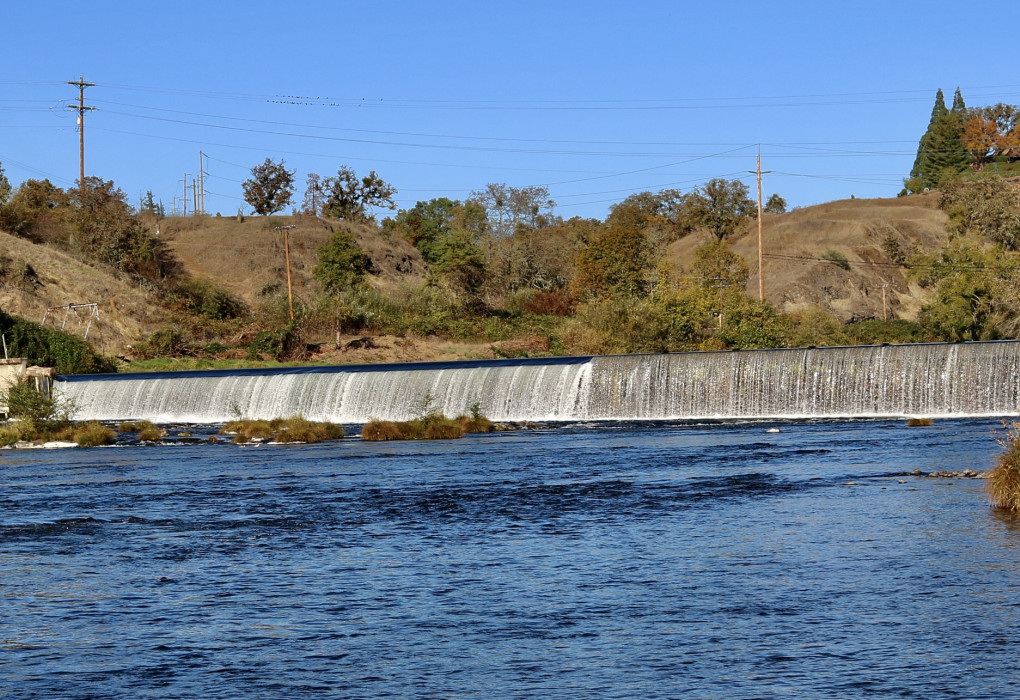Winchester Dam - A Concern for Fish and Public Safety
Jim McCarthy, the Southern Oregon Coordinator for WaterWatch of Oregon has been working on bringing the rule of law to owners of Winchester dam for the past three years. As recently shared with many, the Dam is harming the wild fish returning to the North Umpqua River and the owners have neglected to take action to improve fish passage.
After looking deep into concerns with the dam, Jim discovered concerning public safety evidence that has been ignored for years. In the following opinion piece published December 13th, 2020 in the Roseburg News Review, Jim shares these issues and how the dam is affecting the public who recreate and use the waterway below the dam.
Winchester Dam Harms All in Douglas County
Many in Douglas County are aware that conservationists and fishermen have filed suit against the Winchester Water Control District to stop the harm the 130-year-old Winchester Dam inflicts on the North Umpqua River’s invaluable salmon and steelhead. Our groups went to court as a last resort, after dam owners rejected an offer to provide $8,000 in engineering expertise to maximize fish passage efficiency in its dilapidated and outdated ladder, then rejected an offer to raise the public and private funds necessary to remove this deteriorating, obsolete dam. We also reached a dead end after repeated requests that state wildlife officials require the owners make competent repairs in the fish ladder, which lures fish to jump at dead ends above exposed rebar and eroded concrete.
However, people may not be aware of how Winchester Dam’s shoddy upkeep is harming drinking water and putting public infrastructure, private property, and public safety at unacceptable risk. This dam should be of concern to anyone who gets their drinking water from the City of Roseburg or the Umpqua Basin Water Association, anyone who lives or recreates on the river below the dam, and anyone who cares about the emergency personnel and first responders of Douglas County.
According to state investigators, pollution from a 2018 repair at the dam degraded aquatic habitat, killed numerous fish, and harmed the primary drinking water source for the City of Roseburg and the Umpqua Basin Water Association – serving approximately 37,700 people combined. Investigators also found that dam repairs were conducted without following known best management practices, even after authorities provided the dam owners with information in advance on how to protect water quality and fish. In January 2020, officials levied a $58,378 fine for these violations.
2018 likely wasn’t the first time Winchester Dam repairs polluted drinking water supplies. Public records describe “leakage” during one previous repair and a state official complaining to the contractor “about cement in the river and no permits.” State records also show the dam owners have at other times repaired the dam by installing large numbers of pressure treated wood planks. The U.S. Environmental Protection Agency and U.S. Department of Human Services recommend that treated wood not be used where it may come in direct or indirect contact with public drinking water. Winchester Dam is just 50 feet upstream from Roseburg’s public drinking water intake.
It gets worse. A former president and current resident and director of the district has asked an Oregon administrative law judge to rule that their dam repairs should be exempt from state water quality laws. On average, Winchester Dam repairs have occurred once every three years since the 1960s, but public records show no permits for these repairs.
The dam owners’ disregard extends to being prepared as state law requires to assist first responders and emergency personnel when and if the dam fails. The dam’s currently unusable emergency plan dates to 1987 because the owners have ignored years of requests by state safety officials to update this plan. A needlessly chaotic dam failure event could not only harm people and property, it could increase chances Roseburg’s water plant shuts down for an extended period. This fall, after pressure from river advocates, the district agreed to produce a new plan on a set of deadlines extending into 2021.
An emergency plan is required because safety officials categorize Winchester Dam as “high hazard” due to likely loss of life in the case of dam failure among the people who frequent the river just downstream. After an inspection in October 2019, officials downgraded Winchester Dam’s condition to “poor,” asked the owners to hire an engineer to perform a comprehensive inspection, and warned the owners to fix known dam safety issues soon. In fact, Winchester Dam has not received a comprehensive structural inspection since 1987. The requested inspection has yet to be completed.
County and state records show district directors include presumably well-off executives from local businesses. Meanwhile, there may be an increased risk of a failure at the dam after September’s catastrophic North Umpqua fire combined with a heavy precipitation forecast for this winter. People, property, public infrastructure, and emergency personnel are now at unacceptable risk of harm, financial loss, or disruption because these wealthy dam owners could not be bothered to follow rules requiring them to show concern for their neighbors, first responders, and public resources.
It’s long past time to end the needless harm caused by the careless owners of this polluting, fish-killing, and disintegrating dam. This structure provides no flood control, hydropower, or water supply function except to back up the river for a private waterski lake. Please join us in urging state and local officials to take action now to enforce the rule of law at Winchester Dam.
Read more about Winchester Dam by visiting the campaign page today. If you have any questions on the issue or to get more involved contact Kirk Blaine at kirk@nativefishsociety.org

